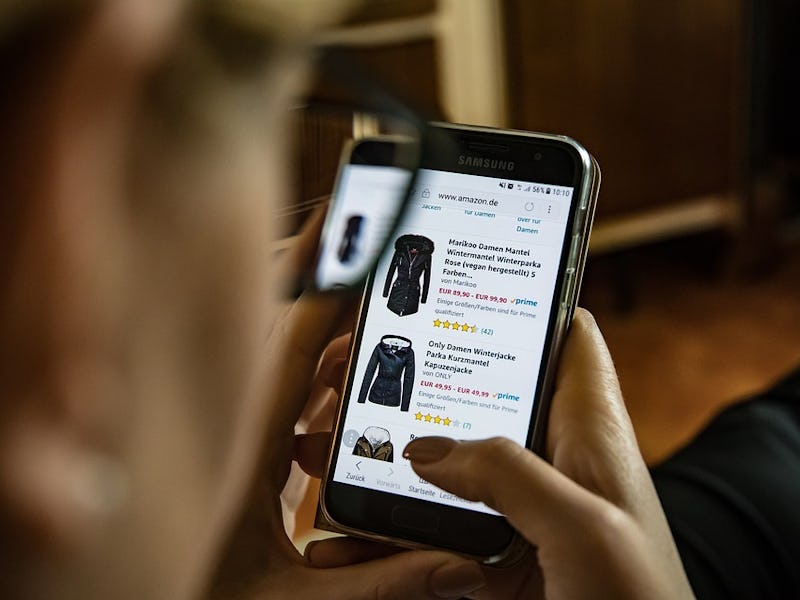Why You Should Stay Off Your Cell Phone While Shopping to Save Money
Unexpected push notifications can be costly.

When wandering down the aisle of a grocery store, most of us don’t think twice about sending a quick text, changing the playlist on Spotify, or pushing away an irrelevant notification. It’s a small swipe of the finger in the moment, but research published in the Journal of the Academy of Marketing Science suggests that this small action may affect what ends up in your cart at the end of a shopping trip.
In an analysis of data from over 2,000 individuals collected across three experiments, a team of scientists from Fairfield University, Oxford University, and the University of Pittsburgh found that people who used a phone while shopping were far less likely to actually to purchase all the items on their list. They were also more likely to succumb to extraneous impulse-buys instead. Co-author Michael Sciandra, Ph.D., an assistant professor of marketing at Fairfield, tells Inverse that this distracted behavior can be used by stores to entice customers into buying more stuff.
“It appears that many consumers overlook or tend to discount some of the negative effects of engaging in casual conversations, text messaging, or surfing social media sites while shopping,” Sciandra says. “We want consumers to recognize that there does appear to be some negative repercussions to these decisions, especially when it comes to unplanned purchasing and missing planned items.”
Participants who were distracted by phone conversations or with push notifications found it harder to complete a simulated shopping exercise.
The study uses three analyses to make the case against distracted shopping. First, Sciandra and his team dove into shopper statistics collected on over 2,600 shoppers entering “mass merchandisers” as part of the 2013 Point of Purchase Advertising International Shopper Engagement study. It revealed that shoppers who reported using their phones in a manner unrelated to shopping — scrolling through Instagram, listening to music, and so on — purchased an average of nine percent more unplanned items than people who weren’t on their phones.
With that data in hand, the team created two simulated shopping experiments to put people to the test.
In one experiment, 116 participants watched a first-person video of a person on a shopping trip. Their task was to check off items on a shopping list when the person in the video placed them in the shopping cart. As this happened, one group of participants listened to a fake phone conversation, while the others were allowed to focus on the shopping task in silence. As they expected, participants who listened to the phone conversations missed more items on the shopping list than those who didn’t.
An example of the push notification experiment, in which shoppers had to keep track of items that ended up in the cart.
The team replicated this experiment a second time on a sample of 115 people but changed it slight. Rather than overhear a phone call, half of the participants received push notifications at random intervals during the trip. The results were the same: The distracted shoppers missed significantly more items on their lists.
“We have evidence that cognitive distraction plays a role in driving these effects,” Sciandra concludes. These distractions, the team continues in the paper, “tax consumers self-regulatory resources” and thereby lead to more unplanned purchases.
The Consequences of Distracted Shopping
Sciandra personally recommends not using a phone while shopping. But since this paper appears in a marketing journal, the text of the paper makes the case that it’s in retailers’ best interest to take advantage of distraction. “To encourage shopping-unrelated mobile device use in stores, retailers have many options,” the authors write.
Some of these options include “subtle advertisements” that encourage consumers to use mobile devices or multitask. Additionally, retailers could include random messages in mobile shopping apps, “including short news updates, weather alerts, or general shopping information” that would likely serve as distractions.
Sciandra notes an important caveat: Not all smartphone use qualifies as distracting. In the first part of the study, the team observed that individuals who reported using their phones for shopping purposes — by making a list on their phone or using an app — decreased their unplanned purchases by an average of 13 percent.
“There are many uses, for example, shopping related uses, that might actually make consumers better or more efficient shoppers,” he says.
In other words, if you’re already employing all your cognitive faculties to overcome the litany of advertising or your cravings for luxury items, a random push notification creates a hole in your armor that’s big enough to allow an impulse buy to slip through. But a well thought out plan, and maybe strategic employment of “Do Not Disturb,” could be enough to fight back.
Abstract: As mobile phones continue to rapidly expand around the world, marketers are seeking to better understand the impact these devices have on consumer outcomes. One common but understudied area is how mobile phones may influence in-store behaviors. Although prior research has investigated the many shopping related activities consumers undertake on their phones, it is still estimated that nearly half of all in-store mobile phone use is unrelated to the shopping task. Therefore, this paper examines the impact of shopping-unrelated mobile phone use, a frequent but understudied phenomenon, on consumers’ ability to accurately manage in-store shopping plans. Using both field and experimental data, we demonstrate that shopping-unrelated mobile phone use negatively affects consumers’ ability to accurately carry out in-store shopping plans and is associated with an increase in unplanned purchasing. Furthermore, we find that consumers who are highly dependent upon mobile phones tend to be the most at risk of deviating from a shopping plan while engaging in shopping-unrelated mobile phone use.